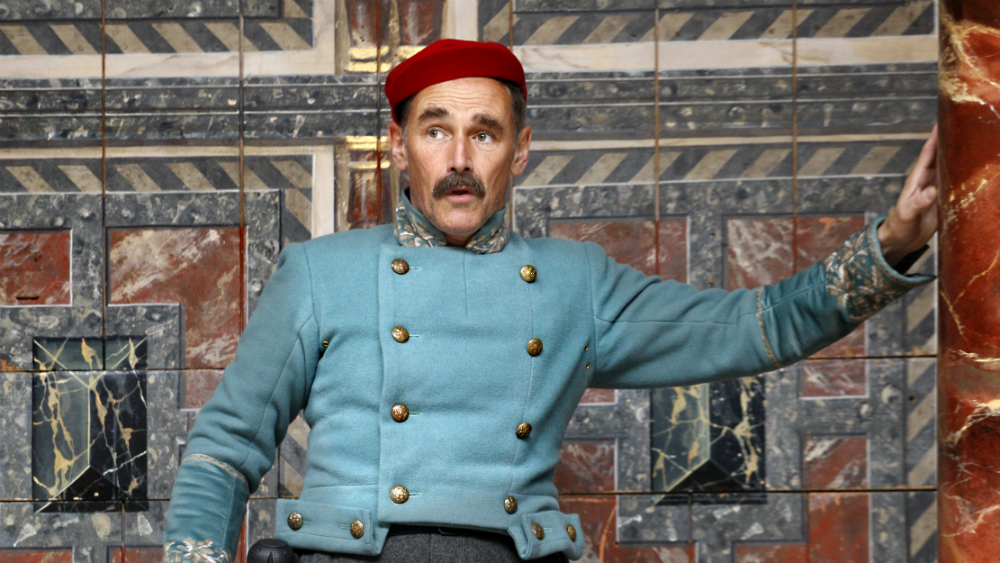London Theater Review: ‘Othello’ With Mark Rylance, Andre Holland
By Matt Trueman
LOS ANGELES (Variety.com) – From his unhinged Hamlet to a sympathetic Richard III, Mark Rylance has always been a great re-inventor of Shakespeare’s key roles. Now, returning to the Globe in “Othello” after a few years away (not to mention an Oscar win for “Bridge of Spies”), he flips the figure of Iago on his head. Instead of a master manipulator pulling on ’s puppet strings, he gives us a lowly, servile soldier outsmarting his superior officer. It’s an idiosyncratic, daredevil performance, one that risks tipping too far into the sort of crowd-pleasing comedy the Globe encourages, but ultimately it proves pivotal to an inspired political reading of the play.
Directed by Claire van Kampen and crisply cut, this is an “Othello” for the era of identity politics and intersectionality; an “Othello” that’s all about race but as rooted in resentment as outright racism. It’s keenly attuned to the structural hierarchies of gender and class, too. Jonathan Fensom’s deceptive design might look like a fable, with Nutcracker toy soldiers in brass-buttoned uniforms and floaty, fashionable frocks for the wives, but it conceals the intricate, real-world politics lurking beneath, as Rylance’s bucolic Iago gets Andre Holland’s cosmopolitan Othello to unravel.
Dressed in a gorgeous blue and bronze military jacket, Holland’s Othello is all polish and gloss. Retaining his American accent — and I can’t remember hearing Shakespeare spoken as such in England, let alone at the Globe — his speeches become buttery-smooth: Othello the orator summoning “a world of sighs” in a voice like soft jazz. He’s a refined, articulate presence; a man of upstanding morality who steps in to break up a rowdy mess party with a cool, authoritative fury. Holland plays him with stillness and grace.
Rather than a trusted second officer, near equal enough to have Othello’s ear, Rylance’s Iago becomes a sidekick of sorts: Sancho Panza to Holland’s quixotic Moor. In a faded uniform that no longer fits, a Trump-red soldier’s cap sat jauntily on his head, Rylance cuts a slightly foolish figure. With a burr-ish Bristolian accent and a disjointed mode of speech, he stoops as he scuttles about — so submissive that no-one begins to suspect him of scheming. It’s a comic attitude, all blustering, fumbling genuflection, but one that sharpens the dramatic irony of Iago’s dismissal by those that assume him a simple, honest sort. More fool them: imagine if Manuel from “Fawlty Towers” had been buffing up on his Machiavelli.
Iago’s relationship with Othello here mirrors that of master and slave, only subtly inverted along racial lines. At one point, Holland raises a cudgel over Iago’s cowering head and he mixes curt, impersonal commands with a mockery of a soldier he treats like a servant. “We cannot all be masters,” Iago muses early on, but it’s easy to see how his constant submission breeds such contempt.
That dynamic finds a counter in Desdemona’s tender relationship with her maid Emilia. Changing for bed, Jessica Warbeck slips off her shoes to save her servant from stooping and Sheila Atim, dressed just as well as her mistress, waits on her with dignity, if not equality.
Van Kampen exposes a toxic masculinity throughout, with both men treating their wives like possessions. As Holland’s Othello spirals into suspicion, the veneer of civility gives way to something vicious and irrational. Even when he goes to strangle his wife, she smiles despite his announcing her fate, imagining him to have come to his senses with a cuddle. It’s this underlying violence Iago sets out to expose, behind Othello’s adopted airs and graces, and it lends the tragic conclusion a real potency — not least when Atim’s fervent Emilia gets the last, damning word. Even if excessive comic asides almost derail its serious intent, this is an incisive “Othello” for our times.

